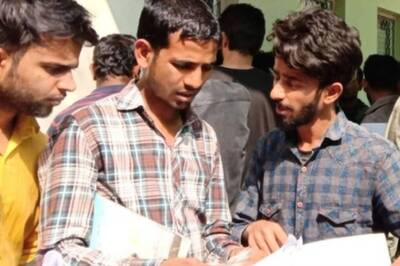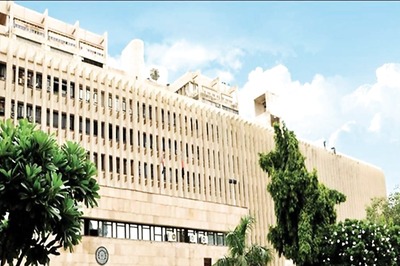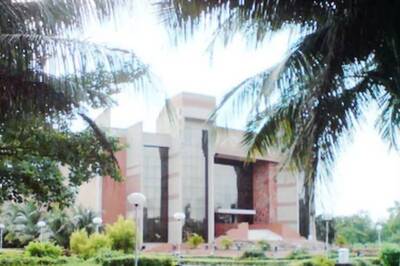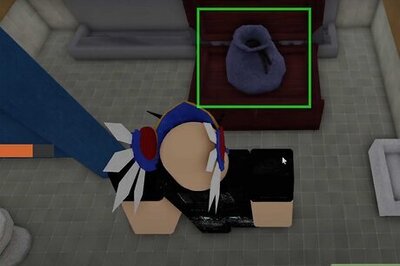
views
CHENNAI: They earn as much as a fresher in a BPO does every month. However, replacing the air-conditioned swanky offices is their rather odd 'workplace' - the traffic signal. They work as a unit, sometimes a mother and child or a group of children waiting for the signal to turn red. As soon as cars and motorcycles form a beeline at the junction to take the right for them to pass, they are into action.“I haven't eaten anything, please give me something so that I can eat" is one of the often repeated lines that comes from these beggars. It helps them gain sympathy from motorists at the signal, not to mention their tattered clothes, unkempt hair and patches of dirt on their faces. Sometimes, they also wear bandages to create a sense of pity for them among people. Amid the serpentine traffic on the city roads, these groups of beggars make hay.In the recent past, the number of beggars at the city’s traffic signals has grown exponentially. City Express took a peek into their lives.However, it wasn’t easy to break their façade. After a little prodding, they broke their silence. Bagavathy (27), who is part of a group that had migrated from Batlagundu (near Dindigul), said, “When we go to the signals, we take our children along with us. Children help us get more money. On a daily basis, we earn `500. After spending on food and other things, we save `200.” The men also bring in their daily share, which is not less than `150.Every beggar settlement has a common feature — children outnumber the adults. Children are considered a primary investment for their 'business' — the younger the better. Most of the communities even have orphaned children who travel along with the group. As part of their 'business expansion plan' the couples marry early and deliver one child every year.“The families which have more children allow others in the settlement even exchange their children for money. Such kids are often called ‘babies-on-rent',” said Gomathi, a mother of three.Nirmala Anand, a research scholar from the Department of Criminology, University of Madras, who is studying the issue of ‘Children being used as a tool in beggary', shared her observations. She said, “I was once tracking a woman, who begs along with a child. She usually begs near the signals in and around Adyar. Over a period of time, I found out that she carries a different child everyday and surprisingly, they never grow. Most of the times, the children are found sleeping and never wake up despite the honking of cars and motorcycles, which I found, very unnatural. I guess they might have been drugging the children to keep them in a state of calm.”Saraswathi (40), who had come from a village down South said, “We left our village because we had borrowed money and were not able to repay. We have our own homes in our villages and for fear of the money lenders, we abandoned our village. Here, life is more comfortable for us. We have also been able to save money.” As her mobile phone rang, she signed off, saying she got to take the call.For these beggars, the peak 'business hours' start from 4 pm, and till the sun goes down, they are able to work more productively, they said. Vallathai (45) said, “Often, we make our children sell stuff like colour books, toys, caps, sun shades, dusters. This gives us an opportunity to get closer to the people travelling by cars and autos. When they refuse to buy, we ask them for cash. More often than not, people give our children the money, thinking that they are honestly trying to do some decent work.”None of the children has ever gone to school. The parents are not interested in sending them to one either, because children form the main part of their 'business'. The other areas they beg are railway stations, subways and other places where people gather in large numbers. Most of them take to begging because of the lack of job opportunities in their native villages. They migrate from the states of AP, Jharkand, West Bengal, Maharashtra, Bihar and from other districts in Tamil Nadu such as Dharmapuri, Tiruvannamalai, Dindigul and Villupuram. “There are a few places in Nellore district of Andhra Pradesh from where people migrate to cities in large numbers to beg. They divide themselves into small groups. Each group gets to choose a particular area in the city and sometimes they divide the areas among themselves,” observed K Ranganathan, Rehabilitation Staff, Karunalaya (a centre for street and working children).When asked how they handle insults and abuses of the people who refuse them money, a woman smiled and said, “Insults are part of the work. It is like a work hazard, we don’t take it seriously. If someone is not interested, there are always others who are more kind.”




















Comments
0 comment